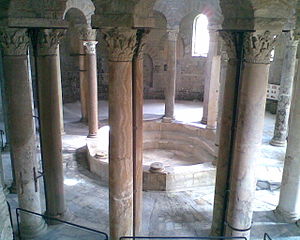Sacraments of initiation

The sacraments of initiation (also called the “mysteries of initiation”) are the three sacraments of Baptism, Confirmation, and Eucharist in Nicene Christianity.[1] As such, they are distinguished from the sacraments of healing (Anointing of the sick and Sacrament of Penance)[2] and from the sacraments of service (Marriage and Ordination).[3]
Eastern and Western approaches
In
catechumen, either formally, as in the Latin Church, or more informally, as in some Eastern Catholic Churches. In his apostolic constitution Divinae consortium naturae on the sacrament of Confirmation,[5] Pope Paul VI declared: "The sharing in the divine nature given to men through the grace of Christ bears a certain likeness to the origin, development, and nourishing of natural life. The faithful are born anew by Baptism, strengthened by the sacrament of Confirmation, and receive in the Eucharist the food of eternal life."[6]
Celebration
According to
grace Jesus has brought into this world. They are always accompanied by the Word of God.[7] Particular focus is placed on the paschal mystery of Christ's death and resurrection. The privileged time of celebrating them is Easter, and by the 4th century it was accepted as the normal time of administering them, although it was also allowed on Pentecost.[8][9]
See also
Wikisource has original text related to this article:
- Sacraments of the Catholic Church
- Thomas Aquinas and the Sacraments
References
- ^ "Sacraments of Initiation". Loyola Press. Retrieved 16 November 2018.
- ^ "Sacraments of Healing". Vatican. Retrieved 16 November 2018.
- ^ "Sacraments of Service". St John XXIII Catholic Parish. Retrieved 16 November 2018.
- ^ Fitzgerald, Thomas. "Understanding the Sacraments of the Orthodox Church". Greek Orthodox archdiocese of America. Retrieved 16 November 2018.
- ^ Divinae consortium naturae
- ^ Translation in Catechism of the Catholic Church, 1212
- ^ Liam G. Walsh (1988) The Sacraments of Christian Initiation, p. 1
- ^ Pope Siricius, Letter to Himerius, 2.3; PL 13,1134
- ^ Edward Yarnold SJ, (1971), The awe inspiring rites of initiation, p. 7.
Bibliography
- ISBN 0-8146-2164-3
- Fisher, J.D.C., (1970) Christian initiation. The Reformation period. Some early reformed rites of Baptism and Confirmation and other contemporary Documents, London: SPCK, p. 273.
- Kenan B. Osborne, ISBN 0-8091-2886-1
- Liam G. Walsh ISBN 0-225-66499-2, p. 317.
- Edward Yarnold ISBN 0-85439-082-0
